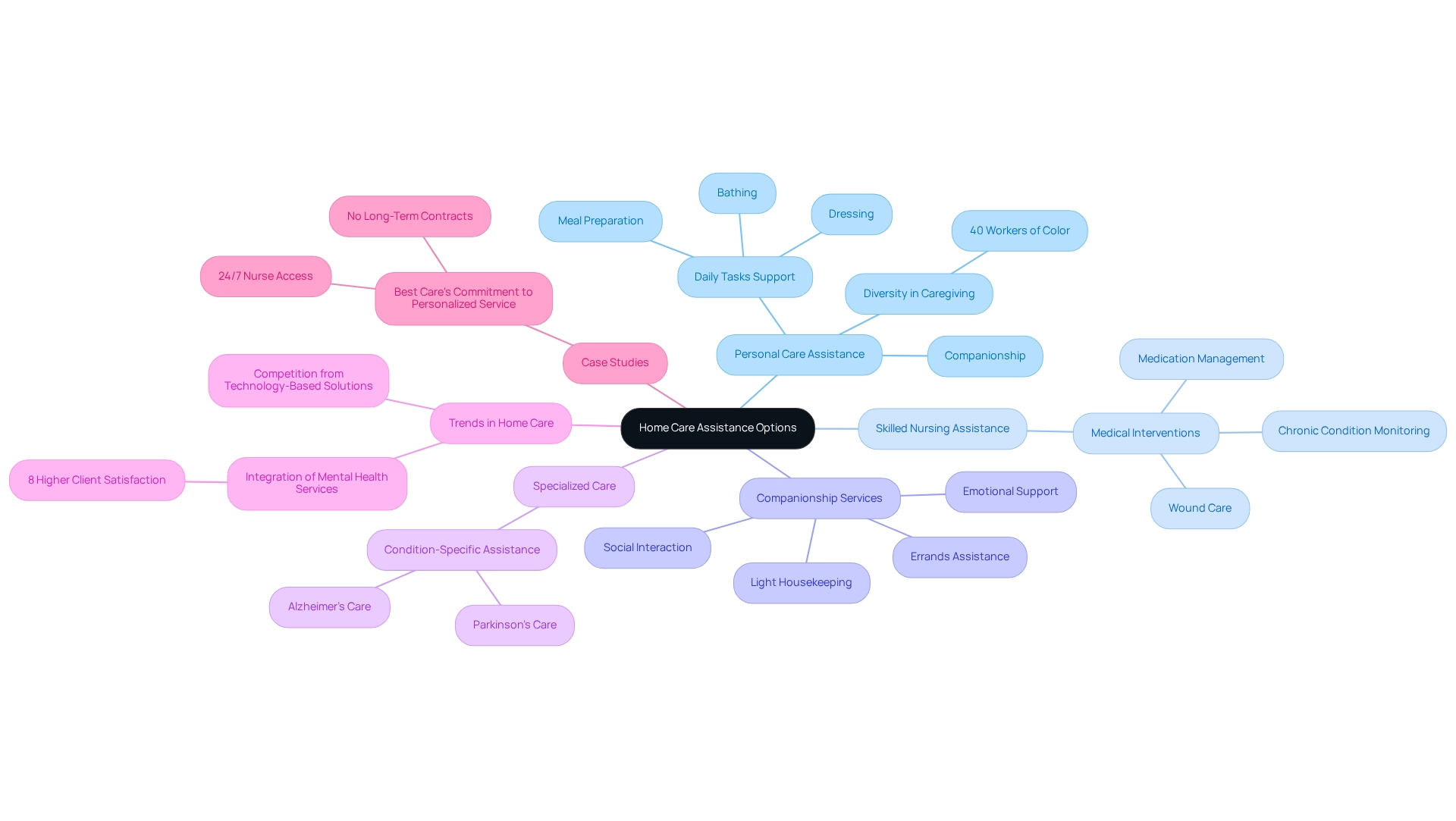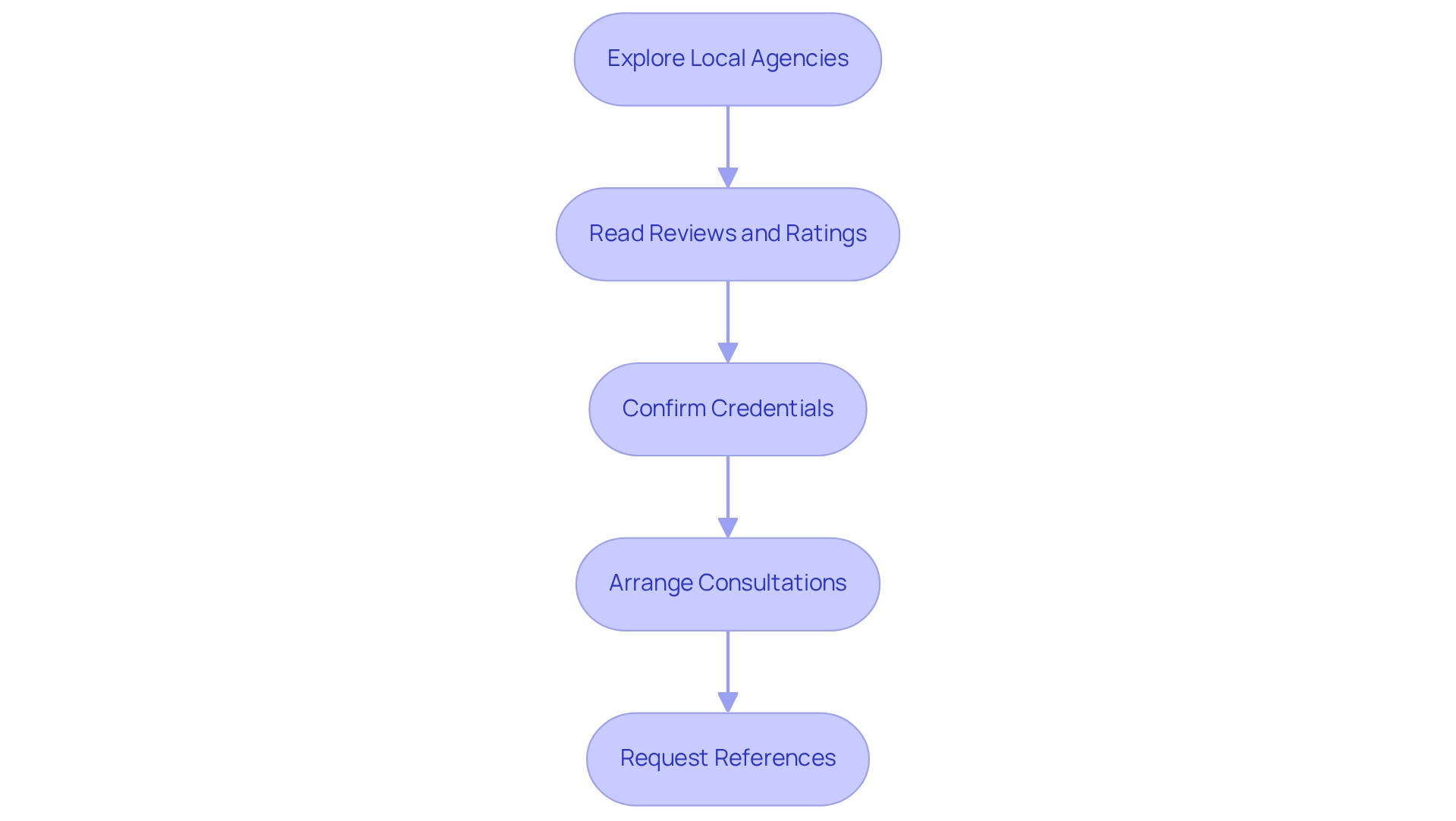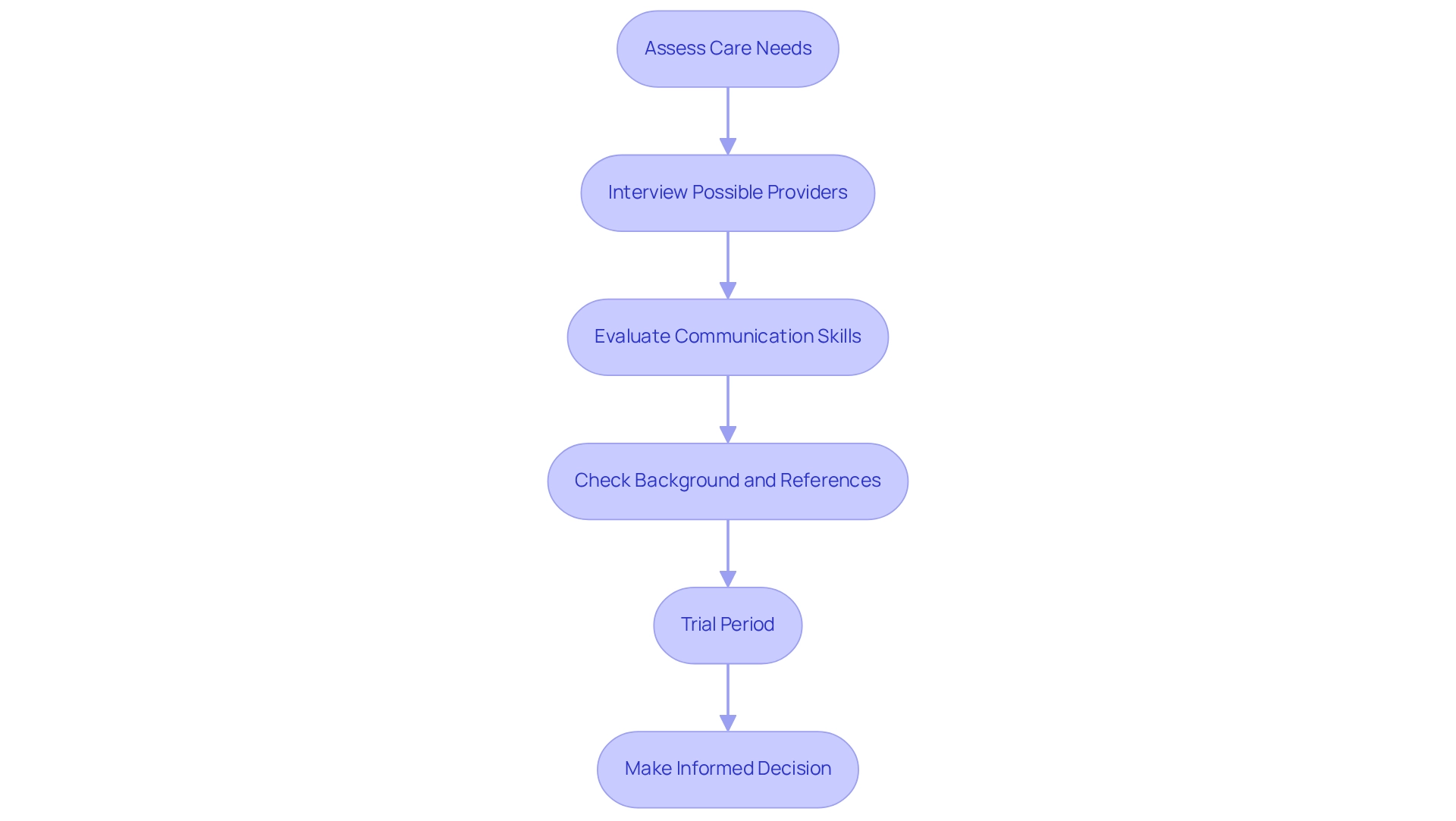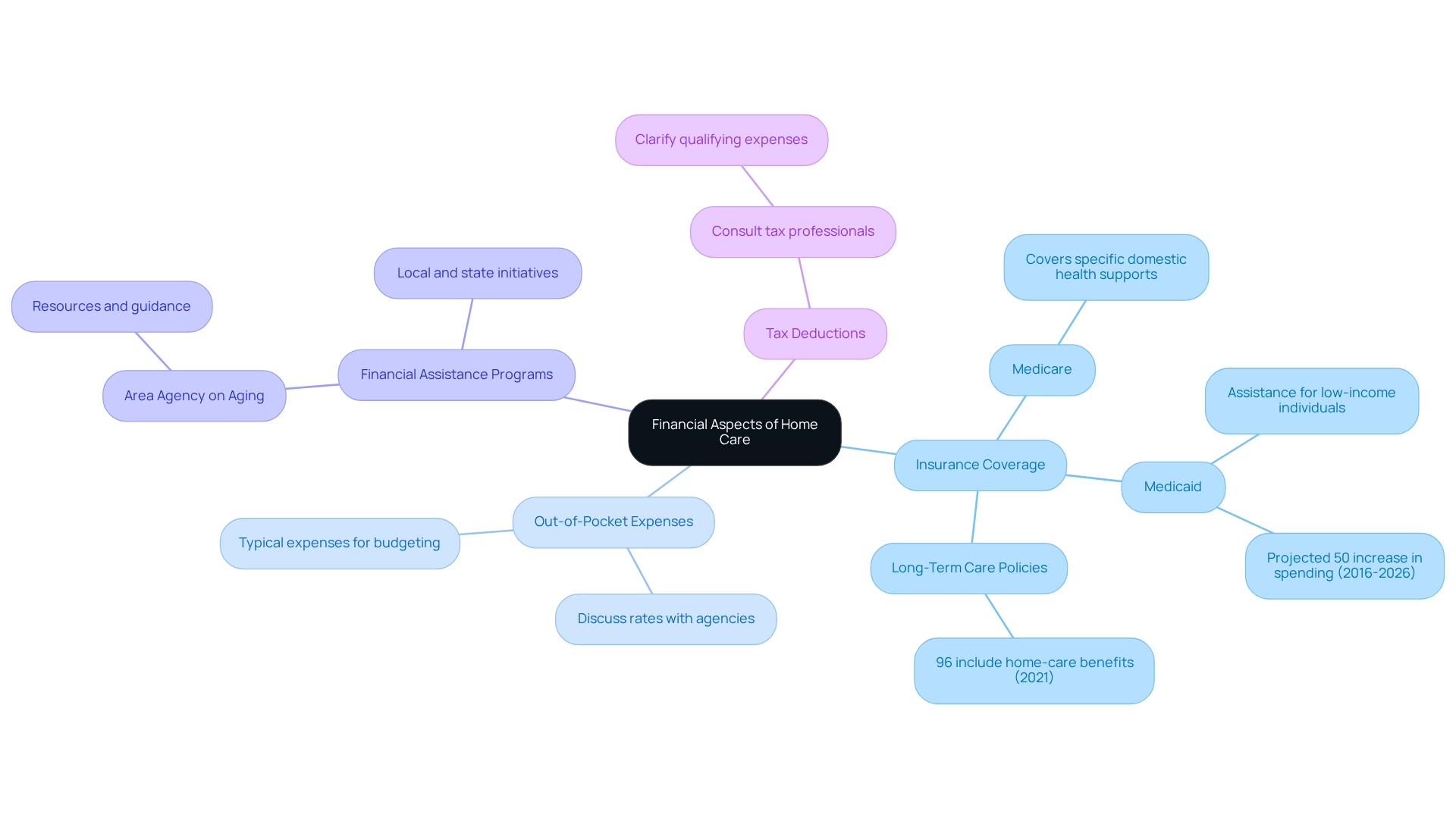Overview
Finding home care assistance near you can feel overwhelming, but you’re not alone in this journey. Begin by exploring local agencies and reading reviews, as these steps can help ease your concerns. It’s essential to confirm credentials and arrange consultations, ensuring that you feel comfortable and informed about your options. Don’t hesitate to request references; this can provide peace of mind as you evaluate the right support services for your loved ones.
Remember, making informed decisions is crucial in ensuring quality care. We understand how much your loved ones mean to you, and we’re here to support you every step of the way. By taking these steps, you can feel confident in the care you choose, knowing that their well-being is a priority. Your comfort is our priority, and together, we can find the right assistance for your family.
Introduction
Caring for aging loved ones can be a challenging journey for families, filled with emotional concerns and important decisions. As you navigate the complex landscape of home care options, it’s essential to understand the variety of services available. From personal care and skilled nursing to specialized support for chronic conditions, each type of service offers unique benefits tailored to the specific needs of seniors.
In addition, as home care continues to evolve, the integration of mental health services and a focus on personalized care are becoming increasingly important. Families, like yours, must equip themselves with the knowledge to make informed decisions that prioritize the well-being of their loved ones.
This article will guide you through various home care assistance options, helping you evaluate local services, select the right caregiver, and address financial aspects of home care. Together, we can empower you to provide the best support for your loved ones in the comfort of their own home.
Understand Home Care Assistance Options
Home support assistance encompasses a variety of provisions, each tailored to meet the unique needs of seniors.
Personal Care Assistance: This support aids with daily tasks, including bathing, dressing, and meal preparation. Personal support aides play a vital role in enhancing seniors’ quality of life by providing companionship and assistance. It’s heartening to note that around 40% of home support workers are individuals of color, showcasing the rich diversity in caregiving.
Skilled Nursing Assistance: Offered by registered nurses (RNs) or licensed practical nurses (LPNs), this type of support includes essential medical interventions such as medication management, wound care, and monitoring chronic conditions. Skilled nursing is crucial for those with complex health needs, ensuring they receive the necessary medical attention in the comfort of their homes.
Companionship Services: Companions provide invaluable social interaction and emotional support, significantly enhancing the mental well-being of seniors. Beyond companionship, they may assist with light housekeeping and errands, addressing both the emotional and practical needs of their clients.
Specialized Care: This category includes assistance designed for specific conditions, such as Alzheimer’s or Parkinson’s disease, requiring caregivers with specialized training. This focused approach ensures that individuals with distinct health issues receive the appropriate care they deserve.
Recent trends indicate that at-home support agencies are increasingly integrating mental health options, which have shown an 8% higher client satisfaction rate. As more seniors turn to personal assistance options, understanding these choices becomes essential for families seeking the right support for their loved ones. By recognizing the various forms of home care assistance near me, families can make informed decisions to ensure their loved ones receive the best possible care in their homes. Remember, we’re here for you, and your comfort is our priority.

Identify and Evaluate Local Home Care Services
Finding the right home care assistance near me can feel overwhelming, but you’re not alone in this journey. Here are some thoughtful steps to guide you through the process:
- Explore Local Agencies: Begin by looking into online resources that list assistance agencies in your area. Websites like Medicare.gov and local directories can help you compile a list of certified providers, ensuring you have access to reputable options. For instance, Best Care Nurses Registry has been a trusted provider of personalized home health assistance in South Florida since 1980, dedicated to ensuring families receive compassionate and effective support.
- Read Reviews and Ratings: Take the time to check reviews on platforms such as Yelp and Google, as well as specialized caregiving websites. Focus on feedback regarding the quality of assistance, reliability, and professionalism of those providing support. Many organizations in South Florida, including Best Care, receive positive reviews, reflecting their commitment to tailored assistance and matching caregivers to clients’ needs.
- Confirm Credentials: It’s essential to verify that the agency is licensed and accredited. Look into any complaints or violations reported to state regulatory bodies, as this information is vital for ensuring the agency meets industry standards. Best Care Nurses Registry takes pride in its compliance with all necessary regulations, offering peace of mind to families seeking care.
- Arrange Consultations: Reach out to potential agencies to set up consultations. This step allows you to meet representatives, ask questions, and gauge their responsiveness to your concerns. Quality agencies like Best Care emphasize tailored assistance, such as caregiver matching, to enhance trust and comfort for clients. As Jim Rohn wisely noted, “One individual showing concern for another signifies life’s utmost worth,” highlighting the importance of compassion in domestic support.
- Request References: Don’t hesitate to ask for references from current or past clients. Their insights can provide valuable perspectives on the agency’s reliability and quality of service. For example, Best Care’s commitment to individualized support and caregiver matching ensures clients find caregivers who truly fit their needs, fostering trust and comfort.
By following these steps, you can confidently evaluate local residential assistance options, such as home care assistance near me, and discover the support that best meets your needs. Remember, home care assistance near me is a priority for agencies that are continually working to expand their workforce and enhance service offerings to meet the growing demand, ensuring they provide the best possible care. For personalized consultations, feel free to contact Best Care Nurses Registry at (888) 203-2529. We’re here for you, and your comfort is our priority.

Select the Right Caregiver for Your Needs
Choosing the right provider for your loved one can feel overwhelming, but by following a few essential steps, you can secure home care assistance near me to ensure they receive the best possible support.
-
Assess Care Needs: Start by identifying the specific needs of your loved one. What are their medical requirements? What personal preferences do they have? Understanding these aspects, along with their daily activities that may need assistance, is crucial. A comprehensive evaluation lays the groundwork for finding someone who can effectively meet those needs.
-
Interview Possible Providers: Next, conduct interviews with potential providers to assess their qualifications, experience, and compatibility with your loved one. Ask about their training, past experiences, and caregiving philosophy. Remember, Certified Nursing Assistants (CNAs) typically receive extensive training focused on medical tasks, while Home Health Aides (HHAs) concentrate more on personal care and daily living activities. This step is vital to ensure that the provider’s approach aligns with your loved one’s needs and values.
-
Evaluate Communication Skills: Strong communication skills are essential in a support role. Providers must effectively interact with both the client and their family, addressing concerns and providing updates. Evaluating a support provider’s ability to listen and respond considerately can greatly influence the quality of care delivered.
-
Check Background and References: It’s crucial to verify a provider’s background through reference checks and background screenings. This process ensures that the provider has a clean record and is reliable, offering peace of mind for families.
-
Trial Period: Implementing a trial period can be beneficial. This allows both the supporter and your loved one to adapt and evaluate their compatibility. Observing their interactions during this time can help determine if the provider is a good fit.
By following these steps, families can make informed decisions when selecting a provider for home care assistance near me, ultimately enhancing the quality of support for their loved ones. With the right assistance, caregivers can significantly improve the daily lives of seniors, addressing both their physical and emotional needs. Remember, we’re here for you, and your comfort is our priority.

Navigate Financial Aspects of Home Care
Navigating the financial aspects of domestic assistance can feel overwhelming, but understanding your options can significantly lighten the load. It’s important to find out if your loved one’s health insurance or long-term care insurance includes support for home care assistance near me. Many policies offer partial or full coverage for certain types of care, which can ease financial concerns.
- Medicare and Medicaid: Medicare may cover specific domestic health supports when prescribed by a physician, while Medicaid provides assistance for low-income individuals, encompassing various in-home services based on eligibility. Notably, as of 2021, 96% of newly issued long-term support policies included benefits for in-home services equivalent to facility benefits, highlighting the increasing recognition of the importance of home care assistance near me.
Many families opt to pay for domestic support services out of pocket. It’s crucial to discuss rates and payment structures with the agency upfront to avoid any unexpected costs. Understanding the typical expenses associated with home care assistance near me can help families budget more effectively.
- Financial Assistance Programs: Consider exploring local and state initiatives that offer financial support for residential care. Organizations like the Area Agency on Aging can provide valuable resources and guidance, helping families navigate their available options.
- Tax Deductions: In some cases, home care expenses may qualify for tax deductions. Consulting with a tax professional can clarify what qualifies and how to claim these deductions, potentially providing additional financial relief.

Conclusion
Caring for aging loved ones can feel overwhelming, as families navigate a complex landscape of home care options tailored to meet unique needs. From personal care services that enhance daily living to skilled nursing care for those with complex medical requirements, understanding these services is essential for families striving to provide the best for their loved ones. Companionship and specialized care play critical roles in supporting seniors’ emotional and physical well-being, and the integration of mental health services reflects the evolving nature of home care.
Finding the right local home care service requires thorough research. Families should check reviews, verify credentials, and conduct consultations to ensure they identify reputable agencies that prioritize personalized care. Selecting the right caregiver is equally important, necessitating an assessment of care needs, interviews, and background checks to foster compatibility and trust.
Financial considerations can add another layer of complexity to home care. Understanding insurance coverage, as well as Medicare and Medicaid options, alongside available financial assistance programs, can significantly alleviate the burden of costs. By exploring these avenues, families can make informed decisions that support their loved ones’ needs while maintaining financial stability.
Ultimately, the journey of caring for aging loved ones is about prioritizing their well-being and ensuring they receive the best possible care in the comfort of their own homes. With the right knowledge and resources, families can empower themselves to make choices that enhance their loved ones’ quality of life. Remember, you are not alone in this journey; we’re here for you, and your loved one’s comfort is our priority.
Frequently Asked Questions
What is home support assistance for seniors?
Home support assistance encompasses various provisions tailored to meet the unique needs of seniors, including personal care, skilled nursing, companionship, and specialized care.
What does personal care assistance include?
Personal care assistance aids with daily tasks such as bathing, dressing, and meal preparation. Personal support aides also provide companionship and enhance seniors’ quality of life.
Who provides skilled nursing assistance and what does it involve?
Skilled nursing assistance is provided by registered nurses (RNs) or licensed practical nurses (LPNs) and includes medical interventions like medication management, wound care, and monitoring chronic conditions.
What services do companionship providers offer?
Companionship services provide social interaction and emotional support to seniors. Companions may also assist with light housekeeping and errands, addressing both emotional and practical needs.
What is specialized care in home support assistance?
Specialized care includes assistance designed for specific conditions, such as Alzheimer’s or Parkinson’s disease, requiring caregivers with specialized training to ensure appropriate care for individuals with distinct health issues.
What recent trends are observed in at-home support agencies?
Recent trends indicate that at-home support agencies are integrating mental health options, which have shown an 8% higher client satisfaction rate.
Why is it important for families to understand home care assistance options?
Understanding the various forms of home care assistance is essential for families seeking the right support for their loved ones, ensuring they receive the best possible care in their homes.











